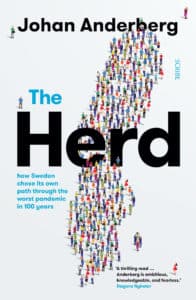If history is any lesson, and it always is, another pandemic is in the offing, whether it comes in a decade or a century. Unfortunately, no matter how much we learned from the COVID-19 catastrophe, there are likely to be plenty of disagreements on how to deal with the next deadly global disease battle. And maybe that’s not bad with some strong caveats attached. It is possible that what was effective in some areas and countries may not be as effective in other regions because of wealth, public health systems, geography and cultural norms. What’ll be critical is the ability to examine and access the different approaches and gauge their effectiveness and possible applications without politicizing the process. At least that’s what Sweden journalist Johan Anderberg believes. The author of The Herd, which examined Sweden’s unique approach to confronting the COVID-19 pandemic, recently spoke with WellWell about the lessons learned from his country’s pandemic battle, whether they might work elsewhere and what we all need to think about before the next worldwide medical challenge hits.
What inspired you to write the book?
Sweden took a different path early in the pandemic, so in Sweden and abroad in Europe, everyone was interested in our path. And the people in charge weren’t good at articulating why they had chosen that path. Since we have this pretty liberal freedom of information laws, I thought I could shed more light on it.
How would you define the Swedish approach to the pandemic?
I define our strategy as based on a willingness to trust people’s judgment and they managed to keep that up for almost the entirety of the pandemic. There were restrictions imposed, a little bit for show, for a few weeks. The people endured them for a few weeks, the second winter of the pandemic, but there was always this reluctance to impose restrictions they never really believed in. 
And is that because of the scientists involved or because of the Swedish culture that they took that approach?
It was a combination because the big question was whether it would fly in Sweden. We didn’t know the answer, but I found it very difficult to imagine us in a lockdown. Norwegian and British people also found it difficult to imagine something like that five years ago. But I think the most important part of the story is that the scientist in charge had a different view of the risks involved with a virus and whether or not these restrictions would work. They ended up on the other side of the spectrum.
You mentioned that Sweden did lock down or become more restrictive. To what extent and how often was that?
It wasn’t a lockdown because the schools were open for everyone up to the age of 16. My kids never missed a day of school. They never wore a mask either. I wore a mask three times when I went to the dentist. They did ban large gatherings, but people didn’t notice that much. I think because only a hockey league was on. The most important thing was that they recommended people to work from home. They didn’t have to, but it was strongly recommended, and most people that had an office job complied.
It begs the question of how Sweden fared in the pandemic. There were fewer total deaths because of the size of the population. Were there fewer deaths per capita?
Yes. If Sweden was a U. S. state, we would be number 43. I think that gives a sense of perspective. But I don’t think it necessarily shows that the hard-hit countries did something bad. It has to do a lot with underlying public health and other factors. Factors that we haven’t even begun to think up.
Was there something about Sweden because it dealt with the pandemic more effectively through fewer restrictions than other countries? The strength of the public health system could have been one.
It might still be a controversial view. I guess that testing probably didn’t matter that much either. There are lots of countries in Europe that have tested lots and were considered very successful early on with testing. But in the end, they still were hard hit. It has been shown to be difficult to control the pandemic through drug testing.
Knowing the data on testing, the rate of infection, and where it’s coming from didn’t that help control the pandemic?
No. That is something that the Swedish scientists were puzzled about. When the WHO came out for their guidance to test, test, test as the WHO presidents did, they had no idea what they were talking about. According to the old pandemic plans, we were supposed to test a lot at the beginning to slow it down as much as possible. But once we had a few thousand cases, and maybe tens of thousands in the US, then it became difficult to control because those 10,000 people hung out with ten other people, creating a group of 100,000 people.
Did the Swedish public health system make it more effective or provide underlying strength in dealing with the pandemic?
One reason Sweden was hit a little bit harder than Denmark is that Sweden has had an influx of immigrants in the last decade. Many individuals are born abroad, and some of these groups have public health support that is a little bit worse than the average Swedes. Not because of genetic reasons, but because their social-economic status is a little worse. Many also must work two jobs, so their life is a little harder. I think that is one part of the difference between Sweden and Scandinavia neighbors, and a few studies have pointed that out as well. So, it’s misleading to say the Swedes generally have good public health.
The reaction to Sweden’s approach to the pandemic varied widely. Pandemic treatments, in general, were highly politicized, especially in the States, Britain and elsewhere. What did you make of that? What does that tell us? It’s important in how we look at pandemics and treatments in the future.
It was interesting they became so politicized. I guess it was partly by coincidence because, to me, it felt like COVID became weaponized in the US and the UK. And it was a successful strategy to blame Boris Johnson and Donald Trump for the failures because they have this sense of incompetence about them, and this was something they didn’t have a handle on either. It became clear that they were in over their heads. I read a book about the Joe Biden campaign and they saw COVID as a net positive for Joe Biden. And so, I think that kept this politicization going because maybe if there hadn’t been an election year in the US, people would have felt that they could have all kinds of opinions no matter which part of the political spectrum they were on. It was interesting because there was a social democratic government in Sweden at the time. In Sweden, this was a left-wing strategy because the people who wanted to lock down were mostly right-wing people and people from the left said that it was unfair to have the people in the projects stay home. People like me could go to a ski cabin.
Were you aware of the amount of coverage Sweden was getting from the outside world? Good and bad? Did that have any impact on the internal discussions in Sweden?
I think it cemented the positive view that Swedes had of the strategy because it felt like lots of Swedes felt a little bit under siege by the media. There were so many inaccurate reports from these newspapers. We were all surprised by how inaccurate they were allowed to be.
Why do you think there was this range of coverage? Take aside the American political system, which I know is difficult to take aside because it’s sort of like a soap opera.
It was good that Sweden was covered because I’m a believer in the liberty of democracy concept that you need to know what other countries are doing and maybe copy what they’re doing. So, I guess that emboldened some people in some countries to open a little faster. The neighboring Scandinavian countries saw the kids weren’t getting ill and they started opening their schools pretty fast. So, Sweden did kind of work as a harbinger for it and that isn’t always a negative word.
Is there a world lesson in all of this?
Yeah. I think that public health has to be holistic. Politics is always one thing at a time. Like terrorism, it’s a crime, especially here in Sweden. It’s always like one thing everyone cares about and they throw money at it and create new problems. And it felt strange to see this happening, even during the peak of the pandemic because this was just one of many societal problems. So, you need to be able to take a few steps back and see if we are creating new problems when we deal with this problem. The war on terrorists is a good example of how one threat and the response can lead to new threats.

About Johan Anderberg
Johan Anderberg is a Swedish journalist who regularly contributes to Swedish and international media outlets, including The Wall Street Journal.
Purchase The Herd on Amazon.












